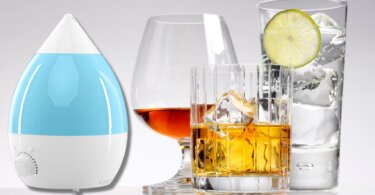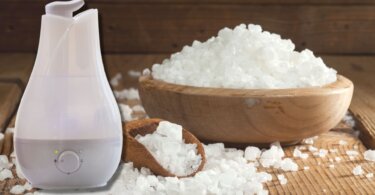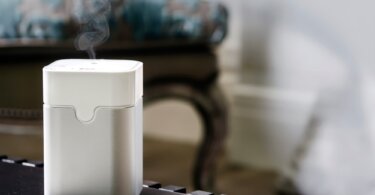Adding moisture to the air is an excellent way to relieve cough, allergies, colds, bronchitis, and congestion. It helps ease congestion, calms sore throats, and also alleviates coughing.
The good news is that there are so many devices in the market to help you do this, like vaporizers and warm-mist humidifiers. But what is the difference between a vaporizer and a warm-mist humidifier? Because both make the air moist by adding water vapor to the atmosphere.
The problem lies in choosing what’s best for you. In this article, we will explain the similarities and the differences between both devices.

Similarities Between Vaporizers and Warm-Mist Humidifiers
Both vaporizers and warm-mist humidifiers work on the same technology. Both have an internal heating technology that boils the water in a reservoir before releasing it as a warm mist into the air.
Thus, both help to reduce discomforts like skin dryness and dry throats or dry noses. Both also reduce nasal congestion and make breathing easier.
What Is The Difference Between a Vaporizer and a Warm-Mist Humidifier?
However, there is a slight difference between humidifiers and vaporizers. Vaporizers have a chest rub additive. It helps disseminate a soothing vapor into the atmosphere. Whereas warm-mist humidifiers only release water damp,
How Vaporizers and Humidifiers Add Moisture To The Air
As we said, both devices use electricity to power a heating element which boils water and in the process, creates steam. This steam cools down before leaving the machine, entering the atmosphere, and reaching the body.
The steam vapors are comparatively hygienic as it boils the water before it leaves the device.
Therefore, you may consider using a cool-mist humidifier if there are kids or pets around. There is always the risk of the hot water in the units burning them if knocked over.
Frequently Asked Questions
1. Do warm-mist humidifiers leave white dust?
They don’t because the water undergoes distillation while boiling water to create steam. The white dust you otherwise find in other humidifiers are remnants of the deposits and minerals found in uninstalled water.
Related article: What Kind of Water is Best to Use in a Humidifier?
2. Do warm-mist humidifiers consume lots of electricity?
Yes, they do. They consume lots of electricity when compared to other humidifier types.
3. Do warm-mist humidifiers make the room warm?
Yes, they do make the room slightly warmer. It’s because of the heat of the steam it produces, which increases the room temperature.
4. Do warm-mist humidifiers cause mold?
No, they will not, if correctly used with a hygrometer. It’s because humidifiers help make a dry atmosphere humid. Switching it off once humidity reaches 32-50% won’t produce enough moisture for mold formation.
5. Do warm-mist humidifiers breed bacteria?
Yes, but they breed fewer bacteria when compared to other humidifier types. It’s because its boiling process produces steam which in turn kills most bacteria. However, make sure you clean it regularly and do not leave water stagnant in it.
6. Can you overuse a humidifier?
Yes, you risk overusing humidifiers if you keep them running even after reaching the room’s optimal humidity levels. Over-humidifying the air only promotes the formation of mold and dust mites.
7. Can a vaporizer cause headaches?
No, vaporizers are machines that emit steam and don’t cause headaches. However, some people are sensitive to camphor-like additives like eucalyptus oil because of their strong smell.
8. Can I add lemon juice to my humidifier?
Yes, you can add lemon juice to your humidifier. It helps in many ways. It emits a fresh citrus-like fragrance into the atmosphere and it helps prevent the growth of mold and bacteria.
9. Does a vaporizer increase humidity?
Yes, a vaporizer manufactures and emits steam into the atmosphere to increase a room’s humidity levels.
10. Can I use essential oil in an ultrasonic humidifier?
Yes, you can as long as the humidifier has a chest rub additive. However, do not add oils directly to the air because it can lead to clogging of the unit.
11. What is the difference between a waterless vaporizer and a humidifier?
The main difference is that humidifiers increase atmospheric humidity while waterless vaporizers do not add water.
12. What is the healthiest type of humidifier?
The healthiest are devices that:
- Are made using anti-mold material or have a UV light.
- Have hygrometers that automatically switches off the unit upon reaching optimal humidity levels.
- Can produce cool or warm mists.
- Contain a provision for adding medicinal oils like eucalyptus.
13. Is a warm or cool-mist humidifier best for sinuses?
Yes, both help with providing sinus relief. While cool-mist humidifiers quickly ease dry nasal cavities, you can use essential oils with warm-mist humidifiers. Its medicinal properties help provide relief from the sinus.
However, cool-mist humidifiers are likely to irritate your sinuses because of bacteria and mold formation.
14. Can a warm mist humidifier make you sick?
No, the chances of getting sick are lower with warm-mist humidifiers because it prevents the formation of mold and bacteria. However, any humidifier can make you sick if it’s not maintained well and if water lies stagnant.
Humidifiers need to be cleaned and maintained well to prevent them from triggering allergies and other illnesses. Overusing humidifiers introduces excessive humidity to the room. This promotes mold formation, which dust mites enjoy.
15. Does a vaporizer help a sore throat?
Yes, a vaporizer can help a sore throat. Dry air aggravates sore throats. So humidifying the air helps provide relief. Besides, you can add Vicks or essential oils to vaporizers with aromatherapy trays for cold and sore throat relief.
16. Which is better? Cool-mist or warm-mist vaporizers?
Both are actually great for adding moisture to dry indoor air. Cool mist variants are a better choice for homes with children and pets around. Warm mist models are quieter and not just add humidity but also keep you slightly warm.
Related article: Best Quiet Dehumidifiers for Homes
17. What does a warm-mist humidifier do?
They heat water to create vapor and are often used to treat colds and flu in colder months.
18. Is it bad to sleep with humidifiers on every night?
It is 100% safe to sleep with humidifiers on every night on the condition that you keep your humidifier well-maintained. Depending on its use, you will have to clean the humidifier every three days or every week.
Related article: How Long Should a Dehumidifier Run Per Day
19. Does a cool-mist humidifier make the room cold?
No. While they create a cool breeze in front of the unit, it’s not enough to change the temperature. Or even to cool off an entire room.
Conclusion
Both warm-mist humidifiers and vaporizers add humidity to the air by creating steam. Both are useful at providing sinus and cough relief and reduce nasal and skin dryness.
The only main difference between the two is that vaporizers generally come with a chest rub additive. It’s easier and safer to use for disseminating soothing vapor into the air.
So basically, the choice boils down to your personal preference. You have to make your final choice based on your budget, the age of the person using it, and if you have kids and pets around.





Leave a Comment